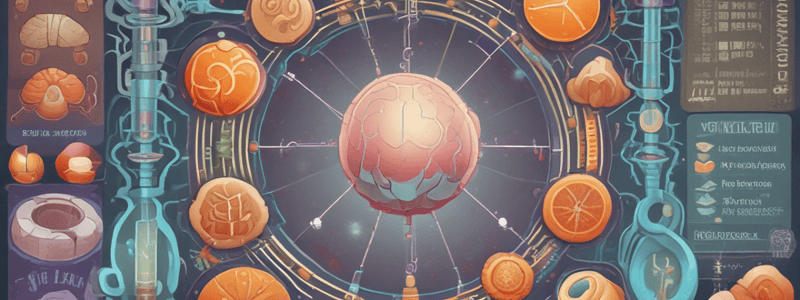Podcast
Questions and Answers
What is the major storage carbohydrate in animals?
What is the major storage carbohydrate in animals?
- Glycogen (correct)
- Starch
- Chitin
- Cellulose
What is the function of the pentose phosphate pathway?
What is the function of the pentose phosphate pathway?
- Synthesis of glycogen
- Production of NADPH (correct)
- Breakdown of glucose
- Production of ATP
What is the result of a defect in an enzyme required for glycogen synthesis or degradation?
What is the result of a defect in an enzyme required for glycogen synthesis or degradation?
- Formation of glycogen with an abnormal structure
- Accumulation of excessive amounts of normal glycogen in specific tissues
- Both a and b (correct)
- None of the above
What is the severity of glycogen storage diseases?
What is the severity of glycogen storage diseases?
What is the location of glycogen in the body?
What is the location of glycogen in the body?
What is glycogen?
What is glycogen?
What is the purpose of glycogenolysis?
What is the purpose of glycogenolysis?
What is the opposite of glycogenolysis?
What is the opposite of glycogenolysis?
What is the primary function of glycogen synthesis and degradation pathways?
What is the primary function of glycogen synthesis and degradation pathways?
Which of the following is NOT a consequence of glycogen storage diseases?
Which of the following is NOT a consequence of glycogen storage diseases?
What is the characteristic feature of glycogen in glycogen storage diseases?
What is the characteristic feature of glycogen in glycogen storage diseases?
Which tissues are primarily affected in glycogen storage diseases?
Which tissues are primarily affected in glycogen storage diseases?
What is the relationship between glycogen and starch?
What is the relationship between glycogen and starch?
What is the consequence of impaired glycogen degradation in the liver?
What is the consequence of impaired glycogen degradation in the liver?
What is the overall effect of glycogen storage diseases on the body?
What is the overall effect of glycogen storage diseases on the body?
Which of the following is a characteristic of glycogen?
Which of the following is a characteristic of glycogen?
Flashcards are hidden until you start studying
Study Notes
Carbohydrate Metabolism
- The major pathways of carbohydrate metabolism start or end with glucose, involving utilization of glucose as energy, gluconeogenesis, glycogen storage, glycogen release, and pentose phosphate pathway.
Glycogen Overview
- Glycogen is the main storage carbohydrate in animals, similar to starch in plants.
- It is a branched polymer of α-D-glucose.
- Glycogen is primarily found in the liver and muscles, with small amounts in the brain.
- Glycogen synthesis and degradation are essential pathways of energy metabolism.
Glycogenolysis and Glycogenesis
- Glycogenolysis is the release of glucose from glycogen.
- Glycogenesis is the storage of glucose as glycogen.
Glycogen Storage Diseases (GSDs)
- GSDs are genetic diseases caused by defects in enzymes required for glycogen synthesis or degradation.
- Defects can result in abnormal glycogen structure or excessive accumulation of normal glycogen in specific tissues.
- Enzyme defects can affect single tissues (e.g., liver or muscle) or be more generalized, affecting multiple tissues (e.g., liver, muscle, kidney, intestine, and myocardium).
- The severity of GSDs ranges from fatal in infancy to mild, non-life-threatening disorders.
Carbohydrate Metabolism
- The major pathways of carbohydrate metabolism start or end with glucose, involving utilization of glucose as energy, gluconeogenesis, glycogen storage, glycogen release, and pentose phosphate pathway.
Glycogen Overview
- Glycogen is the main storage carbohydrate in animals, similar to starch in plants.
- It is a branched polymer of α-D-glucose.
- Glycogen is primarily found in the liver and muscles, with small amounts in the brain.
- Glycogen synthesis and degradation are essential pathways of energy metabolism.
Glycogenolysis and Glycogenesis
- Glycogenolysis is the release of glucose from glycogen.
- Glycogenesis is the storage of glucose as glycogen.
Glycogen Storage Diseases (GSDs)
- GSDs are genetic diseases caused by defects in enzymes required for glycogen synthesis or degradation.
- Defects can result in abnormal glycogen structure or excessive accumulation of normal glycogen in specific tissues.
- Enzyme defects can affect single tissues (e.g., liver or muscle) or be more generalized, affecting multiple tissues (e.g., liver, muscle, kidney, intestine, and myocardium).
- The severity of GSDs ranges from fatal in infancy to mild, non-life-threatening disorders.
Studying That Suits You
Use AI to generate personalized quizzes and flashcards to suit your learning preferences.




